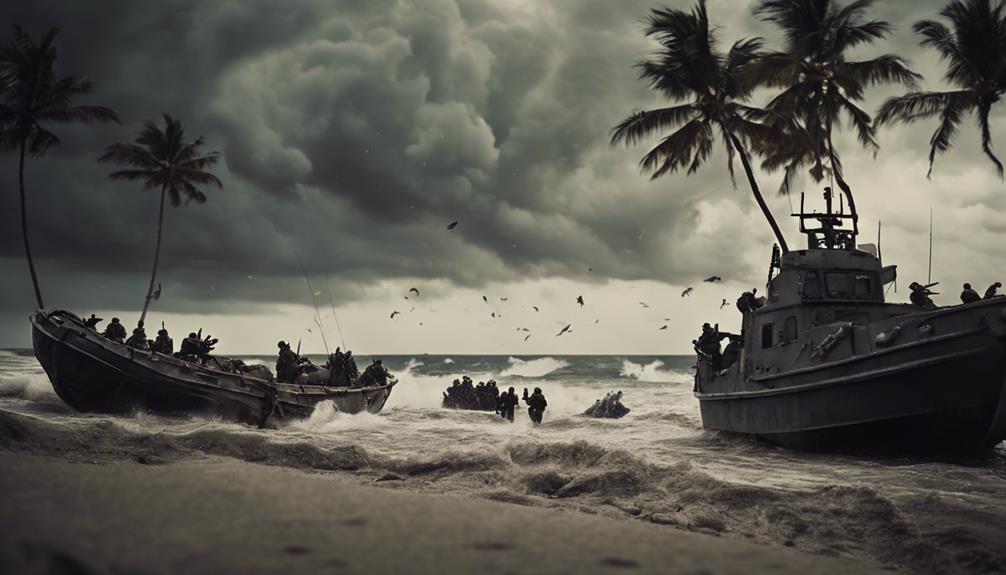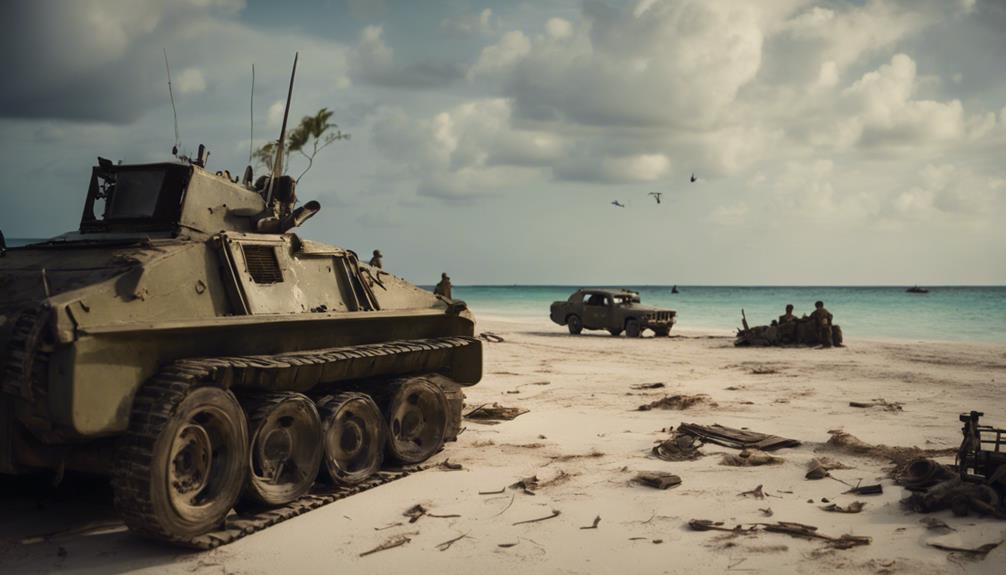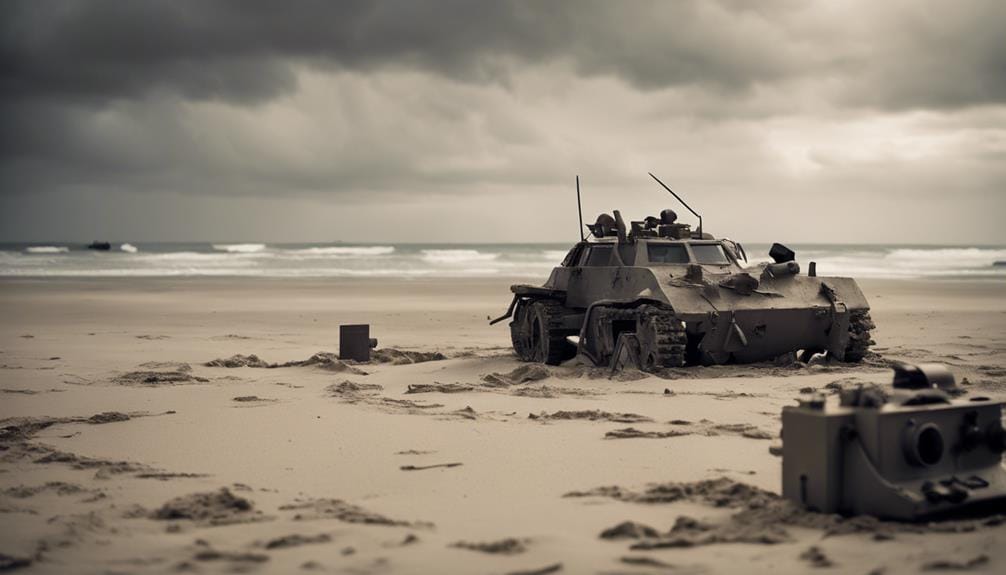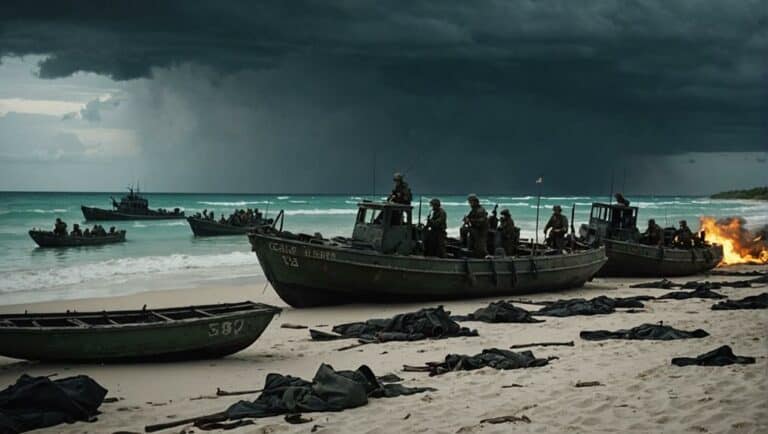Discover the dramatic tale of the Bay of Pigs invasion, a 1961 CIA-led operation that disastrously failed to overthrow Fidel Castro and left the U.S. humiliated on the world stage.
Unravel how this botched mission deepened Cuba's Soviet ties and set the stage for the Cuban Missile Crisis, prompting a major rethink of American foreign policy.
Planning the Invasion
Planning the Bay of Pigs invasion, the CIA aimed to covertly overthrow Fidel Castro by training Cuban exiles in Guatemala for a surprise assault on Cuban soil. The strategy involved creating an invasion force composed of these exiles, who were expected to lead the charge against Castro's government. The CIA's plan was multifaceted, incorporating air strikes on Cuban airfields to neutralize Castro's air power, followed by a surprise landing at the Bay of Pigs.
The overarching goal was to ignite a popular uprising against Castro and establish a defensible position in Matanzas. By doing so, the CIA hoped to create the conditions for a broader anti-Castro movement to gain momentum. Despite the meticulous planning, the operation was hampered by critical flaws. The lack of proper intelligence on the Cuban military's readiness and public sentiment, along with rushed decision-making, compromised the mission from the outset.
Additionally, the invasion force suffered from insufficient support, both concerning logistics and international backing. These deficiencies meant that when the air strikes failed to achieve their objectives, the entire operation faced significant challenges. The covert nature of the plan couldn't compensate for these strategic missteps.
The Invasion Unfolds

As the first light of April 17, 1961, broke, around 1,500 Cuban exiles, known as Brigade 2506, launched their covert assault on Cuban shores, quickly encountering fierce resistance from Castro's well-prepared forces. The invasion, meticulously planned by the CIA, aimed to overthrow Fidel Castro's regime but faced immediate complications. The Cuban forces, notably larger and better equipped, swiftly mobilized to counter the attackers.
Brigade 2506, despite their training and U.S. support, found themselves overwhelmed. Faulty intelligence had underestimated the strength and readiness of Castro's troops. The strategic planning failed to anticipate the rapid deployment of Cuban forces and the challenges of the swampy terrain at the Bay of Pigs. Communications and supply lines were also disrupted, further hampering the brigade's efforts.
Within days, the invasion deteriorated into a decisive defeat. Over 1,100 members of Brigade 2506 were captured, and the remaining forces were either killed or forced to retreat. The CIA's miscalculations and the underestimation of Castro's military capabilities directly contributed to this failure.
The Bay of Pigs invasion, intended to topple Castro, instead solidified his power and marked a notable embarrassment for the United States.
Immediate Aftermath

The swift and decisive defeat of Brigade 2506 led to immediate and far-reaching repercussions for both the captured exiles and the U.S. government. Over 1,100 Cuban exiles were captured, leading to a notable humanitarian and political crisis. The U.S. faced intense embarrassment on the global stage, revealing the failure of its covert operations and casting doubt on its foreign policy strategies.
The aftermath of the invasion saw Cuba's ties with the Soviet Union strengthened. This alliance posed direct implications for global politics, most remarkably setting the stage for the Cuban Missile Crisis in 1962. The presence of Soviet missiles in Cuba was a direct consequence of the failed invasion, as the Soviet Union sought to protect its new ally from further U.S. aggression.
The consequences of the Bay of Pigs Invasion were profound. It forced the U.S. to reassess and adapt its foreign policy and covert operations. The debacle highlighted the need for more effective planning and intelligence in future endeavors.
To conclude, the immediate aftermath of the invasion underscored the complexities of Cold War geopolitics and the far-reaching effects of U.S. actions in the region.
Long-Term Consequences

One of the most significant long-term consequences of the Bay of Pigs invasion was the solidification of Cuba's alliance with the Soviet Union, fundamentally altering the dynamics of the Cold War. Fidel Castro, emboldened by the failed invasion, deepened his ties with the USSR, leading directly to the Cuban Missile Crisis in October 1962. This event brought the world to the brink of nuclear war, dramatically heightening tensions between the U.S. and the Soviet Union.
The Bay of Pigs disaster had profound implications for U.S. foreign policy. The Kennedy administration faced severe criticism for its handling of the invasion, exposing flaws in planning and execution. The failed invasion also highlighted the U.S. government's reluctance to fully support Cuban exiles in Miami, leading to a loss of confidence among anti-Castro forces.
Furthermore, the debacle influenced future U.S. decisions on covert operations and military interventions throughout the Cold War era. The invasion's failure underscored the risks associated with such actions, prompting more cautious and calculated approaches in subsequent operations.
The long-term implications of the Bay of Pigs disaster consequently reverberated through U.S. policy, shaping the nation's strategic outlook during a critical period of geopolitical tension.
Lessons Learned

Analyzing the aftermath of the Bay of Pigs invasion reveals several critical lessons that reshaped U.S. military and foreign policy strategies. First, it underscored the crucial importance of proper intelligence gathering. The CIA's failure to accurately assess the strength and popularity of Castro's forces led to a poorly informed operation. This points to the necessity of thorough contingency planning and coordination among key players to make sure all possible outcomes are considered and resources are adequately allocated.
The invasion also highlighted the risks associated with rushed decision-making and inadequate communication channels. Decisions were made hastily, without proper consultation or dissemination of information, leading to confusion and inefficiency. Political motivations often overshadowed strategic planning, with leaders prioritizing quick political gains over thoughtful, long-term strategies. This misalignment between political objectives and military tactics proved disastrous.
As a result, the Bay of Pigs failure prompted a reevaluation of U.S. foreign policy, placing greater emphasis on diplomacy and negotiation rather than military intervention. This shift aimed to reduce the likelihood of similar fiascos by fostering better communication, more thorough strategic planning, and a balanced approach to foreign policy that integrates both political and military considerations.


